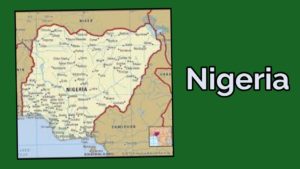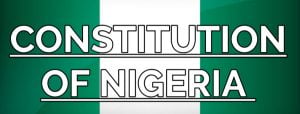Features of the 1999 constitution of Nigeria: The 1999 constitution of the federal republic of Nigeria is the current and legitimate constitution of the country. It was recently amended in 2011, and since after then, there has not been any changes or amendment made on it. Before the drafting of the 1999 constitution, Nigeria has had many constitutions, which in one way or the other, contributed in the drafting of the 1999 constitution. A critical analysis of the current 1999 constitution of Nigeria shows that it is only a development of the previous constitutions (that is, the 1960, 1963 and 1979 constitution).
Nonetheless, all these constitutions has different features. The content of the 1960, 1963 and 1979 constitution of Nigeria is obviously not the same as the current 1999 constitution. In light of that, i will be listing and discussing the characteristics or features of the 1999 constitution of the federal republic of Nigeria in this article. I strongly urge you to read this work painstakingly so that you will be able to grasp everything contained in it.

Top 8 Features of the 1999 Constitution of Nigeria as amended
Below are the features of the 1999 constitution of the federal republic of Nigeria:
- Preamble
- Separation of power
- Presidential system
- Fundamental Human Rights
- Federalism
- Sovereignty
- Supremacy of the constitution
- Independence of the judiciary
Above it just a highlight of the features of the 1999 constitution of Nigeria. As we continue a detailed and clear explanation of these features will be given.
1. Preamble: Just like other constitutions Nigeria has had in the past, the 1999 constitution of Nigeria contains a preamble. Simply put, a preamble is a short preliminary statement or remark, especially an explanatory introduction to a formal document or statute.
In addition to this, the preamble of the 1999 constitution of Nigeria shows the acceptance of the content of the 1999 constitution by Nigerians. It is written to capture the true spirit of the nation and confirm the assent of the constitution.
Generally, a preamble is a very essential part of every constitution because it shows that there was popular participation in the making of the constitution. In other words, a constitution with a preamble by the people is a constitution that is not forcefully imposed on the masses.
2. Separation of power: Another striking feature of the 1999 constitution of Nigeria is separation of powers. As a democratic nation, the principle of separation of powers is inevitable and thus, supported by the constitution. The principle of separation of powers states that there should be a division of power between the three arms of government. This is to avert the rise of tyranny in the land and to ensure accountability.
Section 4, 5 and 6 of the 1999 constitution are the major provisions that supports this political theory. Section 4 provides that the legislative powers of the Federal Republic of Nigeria shall be vested in a National Assembly for the Federation, which shall consist of a Senate and a House of Representatives. The above section gives the legislature the right to Make laws for the country. Section 5 and Section 6, delegates power to the Executive and the legislature respectively.
Recommended: Most Beautiful Countries In The World
3. Presidential system: The 1999 constitution retained the presidential system initially introduced in the 1979 Constitution. A presidential system is a system of government where an individual who is called the president is vested with the real executive power as well as ceremonial functions.
The president is usually elected for a term of 4 years in Nigeria. The sections relating to the president is section 130 – 140. The constitution also provides for the qualifications of the president.
4. Fundamental Human rights: The 1999 constitution contains the Human rights available to the citizens of Nigeria. Human rights can be said to be those inalienable rights available to a human being. Nigeria is one of those countries that have codified their human rights into their constitution.
This is to make sure that the rights of every citizen is adequately protected. The fundamental human right of Nigerians can be found in chapter 4 of the constitution. Some of them include the right to life, freedom of speech, right to own movable and immovable property etc.
Recommended: How to start a successful law firm in Nigeria
5. Federalism: The 1999 constitution provides for federalism, this is a system of government where by power is shared between the states and the central government. It does this through the various lists (exclusive, residual and concurrent list).
The items in the exclusive list are within the control of the Federal government, residual list is meant for states and both state and federal government control items in the concurrent list.
6. Sovereignty: Simply put, sovereignty is the state of making laws and controlling resources without the coercion of other nations. It is one of the features of the current 1999 constitution of Nigeria because the constitution provides so.
Nigeria officially became a sovereign state in 1960 when it was totally free from the British and clolonial influence. Thus, the feature of sovereignty was also present in some of the past constitutions of the country.
Recommended: Process of law making in Nigeria
7. Supremacy of the constitution: The 1999 constitution also provides for the the supremacy of the constitution. This simply means that the constitution of Nigeria is Supreme over all laws in the country and any law that is inconsistent with the Constitution shall to level of that inconsistency be null and void. See section 1(1) and Section1(3).
Section 1(1) of the 1999 constitution provides that the constitution is supreme and its provisions shall have binding force on the authorities and persons throughout the Federal Republic of Nigeria. Accordingly, section 1(3) states that If any other law is inconsistent with the provisions of this constitution, this constitution shall prevail, and that other law shall, to the extent of the inconsistency, be void.
8. Independence of the Judiciary: Independence of the judiciary is a theory that postulates that the judicial arm of the government should be totally independent from other arm of the government. This concept tends to replace dictatorship and unaccountabilty by ensuring that the actions and decision of the government is checked. It is even so during military regime in Nigeria because the powers of the judiciary is not fused with any other arm of the government.
In practice, it is quite pathetic that there is no clear independence of the judiciary in Nigeria because of corruption, tribalism and other factors which I already mentioned in my article about the factors that hinders independence of the judiciary in Nigeria.

Conclusion: So far, i have highlighted and discussed the major features of the 1999 constitution of the federal republic of Nigeria. Some of these features are obvious and currently feasible in our system, whereas some are not. Nevertheless, it is important that you know them so that you will be able to clearly differentiate between the 1999 and other previous constitutions the country has had in the past.

Edeh Samuel Chukwuemeka, ACMC, is a lawyer and a certified mediator/conciliator in Nigeria. He is also a developer with knowledge in various programming languages. Samuel is determined to leverage his skills in technology, SEO, and legal practice to revolutionize the legal profession worldwide by creating web and mobile applications that simplify legal research. Sam is also passionate about educating and providing valuable information to people.
NICE WORK,GREAT NIGERIANS